7th Prague Space Security Conference
PSSI held the 7th Prague Space Security Conference on June 16-18, 2024. The conference welcome and opening remarks were delivered by Roger W. Robinson Jr., Chairman and Co-Founder of PSSI, and Rodrigo da Costa, Executive Director of the EU Space Programme Agency (EUSPA), respectively. Robinson stated that: "We've gathered at a time fraught with peril – with two wars raging and another likely coming our way. These conflicts are already interfering with some of our space assets and operations, but, regrettably, we will likely look back upon this period as the 'good old days'."
There were three distinguished keynote speakers: Jun Kazeki, Director General of the National Space Policy Secretariat in Japan's Prime Minister’s Cabinet Office, who provided valuable insights into Japan's space security initiatives; Lt. Gen. Thomas L. James, Deputy Commander of U.S. Space Command, who highlighted the strategic importance of international collaboration in space defense; and Lt. Gen. Karel Řehka, Chief of the General Staff of the Czech Armed Forces, who emphasized the critical role of space assets in modern military operations.
Throughout the event, various panels addressed the evolving spectrum of space threats and the necessity for enhanced space domain awareness. Other issues discussed were the elements of the new space race from the military, commercial, and governance perspectives, the role of the public-private partnerships in the strategic global competition, and the economic & financial dimensions of space security.
A significant development was the announcement by PSSI that the Prague Space Security Conference will now be an annual event, reflecting the growing importance and urgency of this national security portfolio. The 8th Prague Space Security Conference is currently scheduled for June 15-17, 2025.
To see the list of our previous conferences click here.
Here you can find the Photogallery of the 7th PSSI Space Security Conference.
Conference videos
Remarks and Presentations
Conference speakers
-
Roger W. Robinson, Jr., Chairman and Co-Founder, Prague Security Studies Institute (PSSI)

Roger W. Robinson Jr. was formerly Senior Director of International Economic Affairs at the Reagan National Security Council, where he was the principal architect of the secret economic and financial strategy for the take-down of the Soviet Union. He later served as Chairman of the Congressional U.S.-China Economic and Security Review Commission for the bulk of 2001-2006. Prior to his government service, Mr. Robinson was a Vice President in the International Department of the Chase Manhattan Bank with responsibility for Chase’s loan portfolios in the USSR, Central/Eastern Europe and Yugoslavia. He also served as a personal staff assistant to then-Chase Chairman David Rockefeller for some three years. Mr. Robinson is currently Chairman and Co-Founder of the Prague Security Studies Institute in the Czech Republic. He served for seven years on the Board of Visitors of the Sanford School of Public Policy at his alma mater Duke University and has an MA in International Affairs from the Elliott School of George Washington University. Mr. Robinson has regularly testified before Senate and House hearings and appeared in print and broadcast media outlets for over four decades on economic and financial statecraft with respect to China and Russia.
-
Jan Lipavský, Minister of Foreign Affairs, Ministry of Foreign Affairs of the Czech Republic
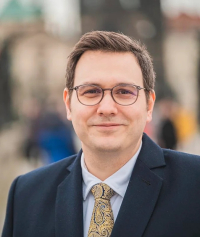
Mr. Lipavský has served as the Minister of Foreign Affairs of the Czech Republic since december 2021. He served in the Chamber of Deputies for four years as Vice-Chairman of the Committee on Foreign Affairs, Defence and Security. In addition, he was a member of the Standing Committee on Hybrid Threats, the Subcommittee on Defence, Cyber and Security Policy and Strategic Concepts of the Czech Republic and the Subcommittee on Migration and Asylum Policy. He focused mainly on issues of energy and international security and hybrid threats. Before entering politics, he pursued a private sector career in banking IT, having worked for McKinsey & Company, Euro RSCG, ZOOT, Total Solutions and Moro Systems. He graduated in International Territorial Studies at the Institute of International Studies, Faculty of Social Sciences, Charles University, and spent a year at the University of Kent in the United Kingdom.
-
Lt. Gen. Thomas James, Deputy Commander, U.S. Space Command
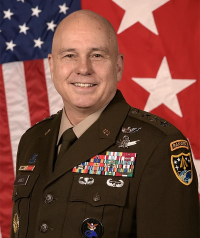
Lieutenant General Thomas L. James serves as the Deputy Commander for United States Space Command, Peterson Space Force Base, Colorado. United States Space Command is the Unified Combatant Command responsible for conducting operations in, from, and to space to deter conflict, and if necessary, defeat aggression, deliver space combat power to for the Joint/Combined force, and defend U.S. vital interests with allies and partners.
Lieutenant General James’ previous General Officer assignments included Deputy Commander, Combined/Joint Force Space Component Command; Commander, Combined Joint Task Force-Space Operations; Commander, Joint Task Force-Space Defense; Director of Operations, U.S. Space Command; Director, Operations, Plans, and Exercises, Joint Force Space Component Command; and Deputy Commander, Joint Functional Component Command for Space.
Lieutenant General began his military career as an enlisted Soldier in the Mississippi National Guard. He later entered active duty as a commissioned officer, serving as a U.S. Army aviator. Following several tours of duty as an Army aviator, Lieutenant General James became one of the first Army Space Operations officers and has served in that capacity for over the past twenty years. -
Maj. Gen. Paul Tedman, Commander, UK Space Command

Major General Paul Tedman was commissioned into the Army Air Corps (AAC) in 1997 and was awarded his army flying badge in 1999. Subsequently, he qualified as a special forces aviator, commanded 1 Regiment Army Air Corps, the Aviation Reconnaissance Force, and was latterly the inaugural commander of 1st Aviation Brigade.
He has flown and commanded on domestic and global joint operations variously at squadron, regiment, task-group and brigade levels. On the staff, he has served as a strategic planner in Army HQ, a joint effects panner in a Corps HQ, and as deputy commander of the UK’s Joint Helicopter Command.
In August 2021, Tedman was selected to be the UK’s inaugural Deputy J5 in US Space Command, Colorado Springs. In this role, he served as a pathfinder for allied integration into the United States newest combatant command and contributed to the development of US space policy, strategy, and plans.
Tedman was awarded a Queen’s Commendation for Valuable Service (QCVS) in 2003 (Western Iraq), a second QCVS in 2013 (Afghanistan), and was made a Commander of the Most Excellent Order of the British Empire (CBE) in 2020. In 2023 he was awarded the US Legion of Merit. He has master’s degrees in aerospace engineering and defence studies, and was a research fellow at Pembroke College, Oxford. He is a fellow of the Royal Aeronautical Society.
Major General Paul Tedman assumed command of UK Space Command in May 2024. -
Maj. Gen. Michael Traut, Commander, German Space Command
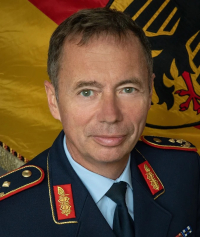
Major General Michael Traut is Commander of German Space Command. Born in Tübingen on 18th December 1964, Major General Traut is married and has two daughters.
He joined the Bundeswehr as a conscript in 1983 and received his initial officer training at German Air Force Officer School in Fürstenfeldbruck. He studied computer science at the Bundeswehr University Munich and was assigned to numerous postings, first as system administrator and programmer and later within NATO’s Integrated Air Defence System as aircraft controller. He later obtained all tactical air battle management operational qualifications.
Major General Traut served in numerous senior functions in German Air Force and Joint Support Service Headquarters as well as within German Ministry of Defence. He took command of Operational Air Wing Mazar-e-Sharif/Afghanistan in 2007 and served as Commandant of the German Air Force Officer School between 2016 and 2020. In 2021, he became Director of National Air Operations until 2023, simultaneously taking command of the emerging German Space Command.
Major General Traut is a graduate from Bundeswehr Command and Staff College Hamburg, Joint Services Command and Staff College Bracknell and Royal College of Defence Studies London.
-
Maj. Gen. Philippe Adam , Commander, French Space Command
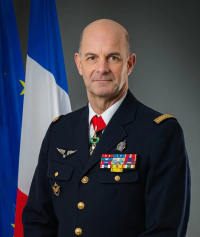
Born on May 9, 1967 in Paris, married, Major General Philippe Adam can rely on a comprehensive technical and operational experience. An Ecole Polytechnique graduate, he joined the French Air Force on August 31, 1988. A fighter pilot by trade, MGEN Adam was engaged in several operations in the Balkans and the Middle East, from 1993 to 1995. Qualified as a test pilot in 1996, he was assigned to the French Flight Test Center in Istres, before becoming operational advisor at the United Arab Emirates Flight Test Center in 2003. Back in France in 2006, he served two years in the Capability Office of the Air Force Staff in Paris, in charge of the “Deterrence & Combat” division. From 2008 to 2010, he took command of the Istres Air Base, covering a major milestone with the commissioning of the ASMP-A nuclear weapon system. He attended the National War College in Washington, D.C. (2010-2011), then joined the NATO International Military Staff as Deputy Chief of the “Air and Ballistic Missile Defense” Branch. In 2013, he became deputy director of the Euro-Atlantic branch at the French Delegation for Strategic Affairs. From 2015 to 2017, he took command of the French National Air Operations Center (Lyon). Promoted to Brigadier General in 2017, he then served as commander of the Air Operation Brigade. In 2018, he was appointed deputy Joint Force Commander of the Barkhane Operation, in N'Djamena, Chad. In 2019, he took command of the French Air Warfare Center (Mont-de-Marsan), overseeing the entry into service of new standards of the French "Reaper" drone and “Rafale”combat aircraft. In 2020, MGEN Adam became chief of the "Future Capabilities" division of the Joint Staff, in charge of planning the procurement of future equipment. He took command of the French Space Command on July 1st, 2022.
-
Col. Giuseppe Gentile, Chief of Space Policy and Innovation Branch, Space Policy Office, Italian Defence General Staff
Col. Giuseppe GENTILE was born in Bari on December 27th, 1977. He joined the Italian Air Force Academy in 1997, where he graduated as a Military Navigator in 2003 and as a Flight Test Navigator in 2013.
From 2003 to 2011, he served as fighter-bomber and reconnaissance navigator at the 156st Wing “LINX”, taking part in operational missions over Afghanistan and important exercises as Red Flag Alaska.
In 2011, he was selected to join the Experimental Flight Test Department and he took part in several projects for the development of the Italian Tornado. From 2019 t0 2020, he took command of the 311st Group of the Experimental Flight Department.
In September 2020, he was assigned to the “newborn” Italian Space Operations Command, where he followed the initial complex process of the Command constitution, being responsible for personnel training and for the development of Italian doctrine for space operation; moreover, as Space Intel Officer, he supported the development phase of the Space Intel carried on by the Italian Intelligence Department.
In September 2022, he was reassigned to the Italian Defence General Staff, where he is currently in charge of the Space Policy and Innovation Branch of the Space Policy Office. Together with other important tasks, his office is responsible for developing military strategy and policy in the space sector, fostering national and international Space cooperation, and monitoring new technological trends.
He has achieved more than 2.500 flight hours on different military aircrafts, and he’s been working in the Space Sector for about 4 years. Currently, he’s also attending an Executive Master in Business Administration provided by Bocconi University/School of Management of Milan.
-
Lt. Gen. Karel Řehka, Chief of General Staff of the Army of the Czech Republic, Ministry of Defense of the Czech Republic
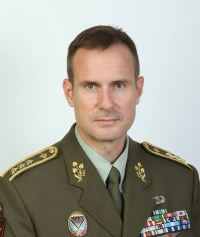
Presently serving since July 2022 as the Chief of the General Staff of the Czech Armed Forces, Lieutenant General Karel Řehka started his service career as a Special Reconnaissance Team Commander in the 6th Special Brigade. Later he served as the Commander of the 601st Special Forces Group, the Director of Special Forces, or a Deputy Commander of the NATO Multinational Division Northeast in Elblag, Poland. In his previous position, he served as the Director of the Czech National Cyber and Information Security Agency, whose primary mission is to ensure the country's cyber security.
Karel Řehka is a prominent Czech military professional with extensive experience in various areas of military service. His academic background began at the Military High School in Opava, from where he went on to the Military University of Ground Forces in Vyškov where he specialized in reconnaissance, and later on completed the General Staff Course at the University of Defence Brno. His training also includes the officers' course at the Royal Military Academy Sandhurst in the UK and Ranger course in the USA.
His notable operational deployments include service as team leader of the 6th Reconnaissance Company with KFOR in Kosovo, Deputy Commander of the Czech Special Forces Contingent in Operation Enduring Freedom in Afghanistan in 2004, and the Commander Czech Special Operations Task Force ISAF in 2011.
Lt. Gen. Řehka has received numerous awards for his excellent and meritorious service, including the Czech Armed Forces Medal of Merit, the Cross of Merit of the Minister of Defence of the Czech Republic, the Commander’s Cross of Merit of the Republic of Poland and the U.S. Army Commendation medal.
With a remarkable record of service achievements and through his commitment and dedication, Lieutenant General Karel Řehka stands out as one of the most prominent, admirable, and inspiring military leaders of the Czech Armed Forces. -
Dr. John Huth, Chief, Space & Counterspace, Defense Intelligence Agency (DIA)
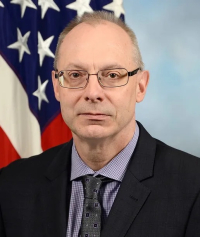
Dr. John Huth is the Chief of the Office of Space and Counterspace. He leads DIA’s activities on collection, characterization, and analysis of foreign space and counterspace capabilities, vulnerabilities, and intent. Prior to this assignment he served as the Defense Intelligence Officer for Space and Counterspace. In that role he was the senior intelligence advisor to the Director and Deputy Director of DIA on the full range of intelligence matter related to space and counterspace topics to include analysis, collection, counterintelligence, international engagement, intelligence policy, and outreach.
Dr. Huth earned his Doctorate in Computational Science from George Mason University, his Master of Science in Physics from the University of Massachusetts, and a Bachelor of Science in Astronomy from Penn State. He served as an Army Intelligence Officer, technology industry leader, and program manager for over 25 years before joining the Defense Intelligence Agency (DIA).
Dr. Huth is a lead contributor to several firsts in space and intelligence that have had long lasting impacts to the space and intelligence communities. He has experience across the full spectrum of intelligence activities from analysis to collection, and enterprise management. Dr. Huth has led multiple cross-discipline organizations at the office level.
-
Dr. Scott Pace, Director, Space Policy Institute, Elliott School of International Affairs, George Washington University
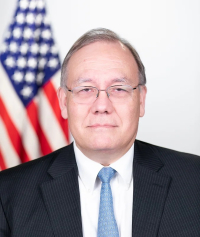
Dr. Scott Pace is the Director of the Space Policy Institute and a Professor of the Practice of International Affairs at George Washington University’s Elliott School of International Affairs. In addition, he is currently serving as the Director of the International Institute of Science and Technology Policy as well as the Master of Arts program in International Science and Technology Policy.
Dr. Pace rejoined the faculty of the Elliott School in January 2021 after serving as Deputy Assistant to the President and Executive Secretary of the National Space Council from 2017-2020. From 2005-2008, he served as the Associate Administrator for Program Analysis and Evaluation at NASA.
Dr. Pace received the Order of the Rising Sun with Gold and Silver Stars from the Government of Japan in 2021, the Office of the Secretary of Defense Group Achievement Award in 2020, the NASA Outstanding Leadership Medal in 2008, the US Department of State’s Group Superior Honor Award (GPS Interagency Team) in 2005, and the NASA Group Achievement Award (Columbia Accident Rapid Reaction Team) in 2004.
-
Mallory Stewart, Assistant Secretary of State for Arms Control, Deterrence and Stability, U.S. Department of State
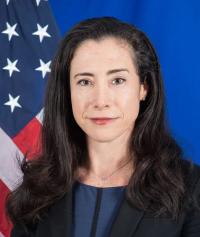
Mallory Stewart is the Assistant Secretary for the Bureau of Arms Control, Deterrence, and Stability (ADS) at the U.S. Department of State. She joined the bureau in 2022, after serving as a Special Assistant to President Biden and Senior Director for Arms Control, Disarmament, and Nonproliferation at the National Security Council since January 2021. Prior to joining the NSC, she was the Senior Manager for Global Nuclear Security and Nonproliferation at the Center for Global Security and Cooperation in Sandia National Laboratories. While at Sandia, she helped lead Sandia’s Cooperative Monitoring Center in its efforts to facilitate scientific engagement for global security. From 2015 to 2017, Ms. Stewart was Deputy Assistant Secretary for Emerging Security Challenges and Defense Policy in what was then called the Bureau of Arms Control, Verification and Compliance. In that role, she oversaw the Office of Emerging Security Challenges and the Office of Chemical and Biological Weapons Affairs. Before that, Ms. Stewart was an attorney adviser in the Department of State’s Office of the Legal Adviser, beginning in 2002. During that time, she worked on numerous legal issues related to nonproliferation sanctions, weapons of mass destruction and conventional arms control, missile defense, and space in the Office of Nonproliferation and Arms Control. She also served in the Office of Treaty Affairs, and she represented the United States before the Iran-U.S. Claims Tribunal as an attorney in the Office of Claims and Investment Disputes.
Ms. Stewart was the State Department lawyer for the U.S. delegation that negotiated the Ballistic Missile Agreements with Poland and Romania, and she was the lead lawyer on the 2013 U.S.-Russian Framework for the Elimination of Syrian Chemical Weapons. For her work on that issue, Ms. Stewart was a recipient of the Secretary of State’s 2014 Award for Excellence in International Security Affairs. Ms. Stewart has also worked as a Nonresident Fellow at the Stimson Center, an Adjunct Assistant Professor at Georgetown University’s School of Foreign Service, and as an associate at the law firm of Sullivan & Cromwell. She holds an A.B. from Harvard College and a J.D. from Stanford Law School.
-
Dr. John Stopher , Former Principal Assistant to the Secretary of the U.S. Air Force for Space and Senior Fellow, Prague Security Studies Institute (PSSI)
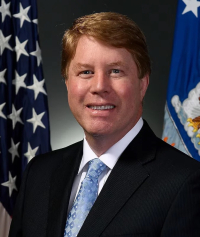
Dr. John P. Stopher is a Senior Fellow supporting PSSI’s Space Security Program. He previously served as the Principal Assistant to the Secretary of the Air Force for Space and was responsible to the Secretary of the Air Force for establishing a Space Force as well as governance, planning, policy, strategy, development, and execution across the defense space portfolio and integration with the National Security Space Enterprise. He was also the lead for international space relations and interdepartmental and interagency matters.
Prior to joining the Air Force in 2017, Dr. Stopher was the President of 377 Omega, a national security space and intelligence community technology, policy, and programs-focused consulting company. From 1998 until 2007, John served on the U.S. House of Representatives, Permanent Select Committee on Intelligence as Budget Director, Staff Director for the Subcommittee on Technical and Tactical Intelligence, and Program Monitor for the National Reconnaissance Office and the National Geospatial-Intelligence Agency. John also worked at SeiCorp, TASC, and Eastman Kodak as an engineer on national space programs.
He earned his PhD in electrical engineering from the University at Buffalo. His research was sponsored by the Strategic Defense Initiative in the area of advanced pulsed power for space systems and taught courses in electromagnetic theory, probability and statistics, electric circuits, and physical electronics laboratory.
-
Rodrigo da Costa, Executive Director, European Union Agency for the Space Programme (EUSPA)

On 16 October 2020, Rodrigo da Costa took up his duties as Executive Director of the European Union Agency for the Space Programme (EUSPA), formerly the European GNSS Agency (GSA). Prior to this, he was the Galileo Services Programme Manager from March 2017.
EUSPA is an Agency of dedicated EU professionals working for a stronger, more competitive and united European Space Programme, creating synergies between satellite navigation (EGNOS & Galileo), Earth Observation (Copernicus) and secure telecommunications (GOVSATCOM). EUSPA designs and delivers user-centered services working together with the European Commission and a wide range of national, European and international stakeholders, industries and user communities. The EU Space Programme is both a resource and a springboard for the European economy, competitiveness and sustainability.
Before joining EUSPA, Rodrigo da Costa held several senior project management, business development, and institutional key account management positions in the space industry, in the areas of human space flight, exploration, launchers and R&D.
Rodrigo da Costa holds a degree in Aerospace Engineering from the “Instituto Superior Tecnico” in Lisbon, a Master’s degree in Aerospace Engineering from the University of Delft, and an MBA from the EuroMBA consortium of Business Schools.
-
Amb. Marjolijn van Deelen, EU Special Envoy for Space, European External Action Service (EEAS)
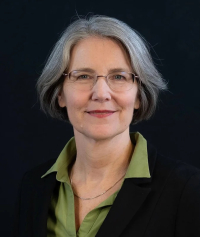
Marjolijn van Deelen assumed the position of EU Special Envoy for Space in February 2024 following 3,5 years of executing the function of EU Special Envoy for Non-proliferation and Disarmament.
Her primary mission is to represent the EU in multilateral fora dedicated to space with a focus on promoting responsible behaviour in space. To that end, she engages with third States through dialogue and consultations. The Special Envoy also has operational responsibilities as to the response to possible threats to or through the systems and services deriving from the EU Space Programme as well as concerning the EU Satellite Centre. She cooperates with European Commission services and contributes to the development of the security aspects of the EU Space Programme as well as all other related matters.
Marjolijn van Deelen is a career diplomat of the Netherlands. Before joining the EU External Action Service (EEAS), she headed the Non-proliferation, Disarmament and Nuclear Affairs Division of the Ministry of Foreign Affairs of the Netherlands with the title of Ambassador. She held several posts abroad (to the international organisations in Vienna, at the Dutch Embassies in Bucharest and San Jose), as well as positions in The Hague (Europe Division, Middle East Division, UN Division, Development Assistance).
Ms. Van Deelen holds a Masters in Geophysics from the University of Utrecht, the Netherlands, as well as a BA in Economics from the American University in Washington DC.
-
Paul Graziani , Chief Executive Officer, COMSPOC

Paul Graziani is the Chief Executive Officer of COMSPOC Corp. The company's mission is to detect, track, characterize, and protect everything in space by delivering enterprise-level Space Situational Awareness systems to government organizations for the safety of spaceflight and national security. COMSPOC Corp is headquartered in Exton, PA.
Prior to the inception of COMSPOC, Paul championed the use of commercial software in the national security and space industries as the co-founder and CEO of Analytical Graphics Inc (AGI) for 33 years.
Paul also serves as the Chairman of the Board for OneSky, an Unmanned Aerial Systems Traffic Management company. Additionally, he is a Director of Passur Aerospace and holds the position of Vice Chairperson at the Federation of Galaxy Explorers (FOGE). He is a Director Emeritus of the United States Geospatial Intelligence Foundation (USGIF) and an Associate Fellow of the American Institute of Aeronautics and Astronautics (AIAA). Paul is a former member of the Board of Governors for the Civil Air Patrol (CAP) and currently serves on the board of the Civil Air Patrol Foundation. After fulfilling his board tenure, Paul was elected to the honorary position of Life Director of The Space Foundation.
Paul earned a Bachelor of Science degree in biology from LaSalle College but quickly pivoted his career to software, launching into satellite mission planning systems with General Electric’s Space Division in 1980. Paul has been happily married to his wife, Shirley, for 37 years and is the proud father of three great children: Kristin, Kevin, and Lauren. He is a serial early adopter of all technology, an avid woodworker, and a sports car enthusiast.
-
Hermann Ludwig Moeller, Executive Director, European Space Policy Institute (ESPI)

Hermann Ludwig Moeller joined the European Space Policy Institute (ESPI) in Vienna in September 2022. As its new Director, he is leading the European Think Tank on Space, responsible for developing approaches to European Space Policy and providing recommendations to European decision-makers and institutions. Prior to joining ESPI, he held leading positions at ESA in the creation of EU Copernicus and in the preparation of the EU Secure Connectivity initiative as Head of Telecommunications Strategy, Programme, and Transformation Office and as Head of Copernicus Space Segment Office. In these functions, Mr. Moeller has been operating with high-level leadership in a complex multi-stakeholder policy environment in public-private partnerships with industry, at the EU level, with EUMETSAT, and with national space agencies and delegations.
Prior to that, he held the ESA Douglas Marsh Fellow at NASA and contributed to the creation of the European Internet backbone. He acquired early professional experience at the European Patent Office and with Siemens.
Mr. Moeller holds a master's degree in telecommunications, following studies at Technical University Darmstadt and Ecole Supérieure de Télécommunications - Télécom Paris.
He is of German nationality with working experience in Germany, Italy, the USA, The Netherlands, France and Austria, and is married and father of four children.
-
Dr. Kai-Uwe Schrogl, Special Advisor for Political Affairs, European Space Agency (ESA)

Professor Dr. Kai-Uwe Schrogl is the Special Adviser for Political Affairs of the European Space Agency ESA. Before, he was seconded from ESA to the German Federal Ministry for Economic Affairs and Energy in Berlin to support the German Presidency of the Council of the European Union. Until 2019, he was the Chief Strategy Officer of ESA in Paris. From 2007 to 2011 he was the Director of the European Space Policy Institute (ESPI) in Vienna. Prior to this, he was the Head of the Corporate Development and External Relations Department in the German Aerospace Center (DLR) in Cologne.
Kai-Uwe Schrogl is the President of the International Institute of Space Law (IISL), the global association of space lawyers from more than 50 countries. He served from 2014 to 2016 as chairman of the Legal Subcommittee of the United Nations Committee on the Peaceful Uses of Outer Space (UNCOPUOS) and was from 2020 to 2022 Co-Chair of the Global Future Council on Space of the World Economic Forum (WEF). His most recent publication is “A Research Agenda for Space Policy” at Edward Elgar Publishing. -
Dr. Namrata Goswami, Professor of the Thunderbird School of Management, Arizona State University, Thunderbird School of Global Management

Dr. Namrata Goswami is an author, professor, and consultant specializing in space policy, international relations, and ethnic identity. She teaches at the Thunderbird School of Global Management, Arizona State University, and the Joint Special Forces University and is a consultant for Space Fund Intelligence. She is a guest lecturer at Emory University for seminars on Technology, Society & Governance, and India today. She worked as a Research Fellow at MP-Institute for Defence Studies and Analyses, New Delhi; a Visiting Fellow at Peace Research Institute, Oslo, Norway; La Trobe University, Melbourne, Australia; University of Heidelberg, Germany; Jennings-Randolph Senior Fellow, United States Institute of Peace; and was a Fulbright Senior Fellowship Awardee. She was awarded the Minerva grant by the Office of the U.S. Secretary of Defense to study great power competition in outer space. In April 2019, Dr. Goswami testified before the U.S-China Economic and Security Review Commission on China’s space program.
Dr. Goswami is a member of the International Astronautical Federation (IAF) task force on security. Her co-authored book, Scramble for the Skies: The Great Power Competition to Control the Resources of Outer Space was published in 2020 by Lexington Press; Rowman, and Littlefield. Her book on The Naga Ethnic Movement for a Separate Homeland was published in 2020 by Oxford University Press. She has published widely including in The Diplomat, the Economic Times, The Washington Post, Ad Astra, Asia Policy, Live Encounters Magazine, Cairo Review. She was invited in November 2019 to share about her life and her work at a Tedx event held at the Rosa Parks Museum, in Montgomery, Alabama. She has appeared on CNN, BBC, Deutsch Welle, France24, and Channel 4, to share her research on space policy. She is currently working on two academic book projects, one on China’s Grand Strategy and Notions of Territoriality and the other on Spacepower Theory and Practice: Case Studies of U.S. China, India, Russia, and Japan.
-
Richard DalBello, Director, Office of Space Commerce, National Oceanic and Atmospheric Administration, U.S. Department of Commerce

Richard DalBello is currently the Director of the Office of Space Commerce, National Oceanic and Atmospheric Administration, U.S. Department of Commerce. In this role, he is responsible for managing the Department’s efforts to establish a space traffic coordination system to ensure safe space operations for commercial and international civil space ventures. In addition, Richard is responsible for the regulation of the US commercial remote sensing industry and for general advocacy, across the government, for commercial space industry interests.
Prior to joining the Department of Commerce, Richard was Virgin Galactic’s Vice President of Global Engagement. In this role, Richard was responsible for international business development for the company’s unique fleet of carrier aircraft and space vehicles. Prior to joining Virgin, Richard served as Director, Space and Aeronautics, in the White House Office of Science and Technology Policy. In this role, he served as the principal advisor on space and aeronautics matters to the Science Advisor to the President. In this position, Richard played a key role in the development and implementation of the Administration’s domestic and international space policy and program priorities.
Prior to joining OSTP, Richard served as the Vice President of Government Affairs for Intelsat General. He served previously as president of the Satellite Broadcasting and Communications Association, and for more than three years as the president of the Satellite Industry Association.
Richard earned a bachelor’s degree in political science from the University of Illinois, a master’s degree in law from McGill University, and a doctorate in jurisprudence from the University of San Francisco. -
Deanna Ryals, Director, International Affairs, Space Systems Command, U.S. Space Force
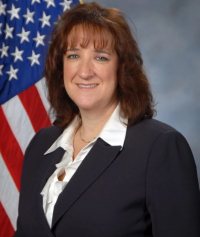
Ms. Deanna L. Ryals is the Director, International Affairs, Space Systems Command, Los Angeles AFB, CA. In this role, she is responsible for driving innovative partnerships with Allies, InterAgencies, and Industry to build a joint robust and resilient military space enterprise that is “Allied by Design”. Ms. Ryals is the USSF lead in developing and executing space FMS and shapes the use of armaments cooperation to set the conditions for an allied inclusive space architecture in accordance with Department and Service strategic guidance.
Ms. Ryals entered federal government service in 1988, and for more than 25 years, she supported the DoD in both civil service and industry in financial management and acquisition. In 2000, Ms. Ryals moved to the Secretary of the Air Force staff in the Space Acquisition Directorate and managed a MILSATCOM terminal portfolio worth $10B, then took over as the single SAF/AQS focal point for international activities. In 2012, Ms. Ryals moved to the Air Force Program Executive Officer for Space Launch (AFPEO/SL) as the PM for Acquisition Strategy development and secured DoD Acquisition Executive approval of a new acquisition strategy for future DoD NSS launches that introduced a competitive environment for all certified U.S. launch service providers. Ms. Ryals rejoined MILSATCOM in January 2013 with her transition to Space and Missile Systems Center (SMC). After being named SMC’s Chief Partnership Officer in 2018, Ms. Ryals ascended to her current role as Director, Int’l Affairs with the stand up of Space Systems Command in August of 2021. -
Dr. Pascal Faucher, Programme Manager, Defense and Security, Centre national d'études spatiales (CNES)

Dr. Pascal Faucher is graduated (1997) from the Ecole Nationale Supérieure de l'Aéronautique et de l'Espace (SUPAERO). He also holds a Master’s Degree in Ocean, Atmosphere and Biosphere (1998) and a Ph. D. in Physical Oceanography (2001) by the University Paul Sabatier, funded by the French Ministry of Defense, and an Executive Master of Business Administration (2007) by ESCP Business School. After a post-doctoral position in the European Project Marine Environment and Security for the European Area (MERSEA), his experience includes more than 20 years of various positions at CNES headquarters. For the last 12 years, as a programme manager in Defense and Security, he is responsible for the following themes: space security, space situational awareness, space surveillance and tracking, space traffic management, space sustainability, space debris, space weather, planetary defense.
He is the Chairman of the European Union Space Surveillance and Tracking Partnership (EU SST) since 2017, and co-Chairman of the European Union Industry and Start-ups Forum on Space Traffic Management (EISF) since 2022. He is also the Chairman of the Space Security Committee of the International Astronautical Federation (IAF) since 2021. He is a French delegate to the Programme Board SSA of ESA, the EU Space Programme Committee in SSA configuration, the EU STM Stakeholder Mechanism Main Group, the Administrative Board of EUSPA, the Steering Group of the Inter-Agency Space Debris Coordination Committee (IADC), the Steering Committee of the Space Mission Planning Advisory Group (SMPAG), the United Nations Committee on the Peaceful Uses of Outer Space (COPUOS), as National Point of Contact to the Working Group on the Long Term Sustainability of Outer Space Activities (WG LTS). In France, he chairs the National Coordination Group on Space Weather (GCME). He is a member of the French Steering Group on Unidentified Aerospace Phenomena (GEIPAN).
-
Jun Kazeki, Director General National Space Policy Secretariat, Japan
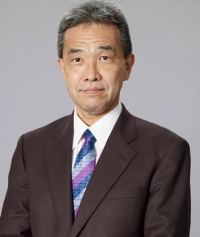
Mr. Jun Kazeki has more than thirty-three years of experience in the field of trade and economic policies. He has also been intensively engaged in national security policy for the last decade. As from July 2023, he has served as Director-General for the National Space Policy Secretariat at the Cabinet Office of the Japanese Government. He joined the Ministry of Economy, Trade and Industry (METI) of the Japanese Government in 1990. Most recently, he served as Executive Advisor at the National Graduate Institute for Policy Studies (GRIPS Alliance), focusing on Economic Security and Emerging Technology. Between 2020 and 2022, he served as Director-General for the Trade Control Department, where he was responsible for export controls, export and import regulations, sanctions, investment screenings and trade remedies. He also worked for policy coordination on economic security, including protection and promotion policies on semiconductors and other critical or important technologies. Between 2007 and 2010, he was Counsellor for Permanent Mission of Japan to the international organizations in Geneva. Between 2002 and 2005, he worked for the OECD Trade in Paris as a Senior Trade Policy Analyst. He graduated from the Faculty of Law of the University of Tokyo in 1990. He earned a master’s degree from Columbia University Law School (LLM ’95) and was admitted to the New York State Bar. He earned another degree at the School of Law of New York University (LLM Trade Regulation (Antitrust and Economic Laws) ’96).
-
Kari Bingen, Director, Aerospace Security Project, Center for Strategic and International Studies (CSIS)

Kari A. Bingen is the director of the Aerospace Security Project and a senior fellow in the International Security Program at the Center for Strategic and International Studies (CSIS). She joined CSIS from HawkEye 360, an innovative space technology company creating a new class of radio frequency (RF) data and analytics, where she was the chief strategy officer. Prior to the private sector, Kari served as the deputy undersecretary of defense for intelligence and security, overseeing the defense intelligence and security enterprises, comprising more than 120,000 personnel and an annual budget of over $54 billion. Before that, Kari served as the policy director on the House Armed Services Committee and staff lead for its Strategic Forces Subcommittee, advising members of Congress on defense policy, program, and budget matters. Prior to entering government, Kari specialized in national security space issues, working with U.S. defense and intelligence community clients, first as a space systems analyst at SRA International’s Adroit C4ISR Center, and then as a senior space policy analyst at the Aerospace Corporation.
In addition to her work at CSIS, Kari is an adjunct assistant professor at Georgetown University, and serves on a number of U.S. government, corporate, and nonprofit advisory boards. She graduated from the Massachusetts Institute of Technology with a degree in aeronautics and astronautics. -
Dr. Jong-Shinn Wu, Director General, Taiwan Space Agency (TASA)

Prof. Jong-Shinn Wu received his MS and BS degrees both in Mech. Eng. of National Taiwan University, Taiwan, in 1986 and 1988, respectively, and his Ph.D. degree in Aerospace Eng., U. of Michigan, Ann Arbor, USA, in 1994. He then worked as a postdoctoral research fellow until 1995 in the same department. Later, he worked at the NSPO of Taiwan for two years. He then joined the Dept. of Mech. Eng. of NCTU, Taiwan, in 1998 until now as a Distinguished Professor and the director of ARRC. He has been working on rarefied gas dynamics, low-temperature plasma physics, kinetic-based numerical schemes, hybrid rocket propulsion, plasma medicine, and parallel scientific computing. Recently, he received the most prestigious 2018 Outstanding Research Award of MOST (Ministry of Science & Technology), Taiwan. He is now an ASME Fellow, AIAA Associate Fellow, IEEE Senior Member, AIAA Hybrid Rocket Technical Committee member, and Emerging Plasma Nanotechnologies (TC 17 member) of the IEEE Nanotechnology Council. He took the position of Director General of NSPO (National Space Organization), Taiwan, in 2021. NSPO was promoted to be the independent space agency of Taiwan and was changed to TASA (Taiwan Space Agency) officially in January 2023.
-
Dr. Hiroshi Koyama, Executive Fellow, Electronic Systems Group, Mitsubishi Electric Corporation
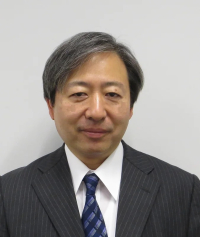
Dr. Hiroshi Koyama currently serves as a Fellow of the Defense and Space Systems Group at the Mitsubishi Electric Corporation.
In 1987, he joined in Mitsubishi Electric Corporation and started his career as Chief Engineer for the Rendezvous and Docking System of Engineering Satellite-VII & H-II Transfer Vehicle(HTV). He has also developed various observation satellites. He was appointed Deputy Manager of the Space Systems Department in 2013 and Executive Fellow in 2015. In 2019, he was assigned to Fellow of the Defense & Space Systems Group and promoted the utilization of space systems such as high precision positioning from navigation satellites and Earth Observation data from EO satellites.
From 2022, he is also assigned as a board member of the Advanced Satellite Systems Technology Center (ASTEC) which is dedicated to identifying and analyzing the latest trends in technology, markets, and policies for satellite development and satellite applications in Japan and abroad. He is a member of IAA and holds a PhD in engineering. -
Isabella Poldrugo, (Acting) Head of Unit for Space Policy, DG DEFIS, European Commission
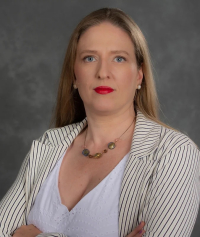
Ms Poldrugo is Head of Unit (acting) of the European Commission - Directorate-General for Defence Industry and Space (DEFIS), responsible for EU Space Policy. The objective of the unit is to design and ensure a coherent and overarching EU Space policy, including regulatory aspects and to foster an innovative and globally competitive EU Space ecosystem.
Isabella Poldrugo joined the Commission in 2019, where she worked as policy officer in the Unit dealing with space policy in the Directorate-General for Defence Industry and Space (DG DEFIS).
Before, she spent ten years in the European Parliament as policy advisor to Members of the European Parliament, dealing with dossiers on energy, industry and trade. She served also as policy advisor to the Italian Minister of Defence and to the Undersecretary of State for Defence. -
Václav Kobera, Director of ITS and Space Activities, Research, Development and Innovations Department, Ministry of Transport of the Czech Republic
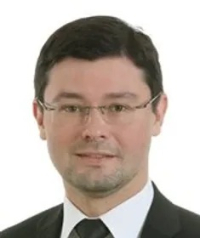
Since 2011, Mr. Václav Kobera, J.D., has served as the Director of Intelligent Transport Systems at the Space Activities and Research, Development, and Innovation of the Ministry of Transport of the Czech Republic. He is also the Chairman of the Administrative Board of the EU Agency for Space Programme (EUSPA). In addition, since 2017, Mr. Kobera has served as the Head of Delegation of the Czech Republic to the European Space Agency (ESA). Between 2013-2018, he was a Member of the Administrative Board of the European GNSS Agency (GSA) representing the Czech Republic and the Chairman of the ESA Programme Board on Satellite Navigation (PB-NAV) between 2017-2020.
-
Dr. Peter Hays, Adjunct Professor, Space Policy Institute, George Washington University
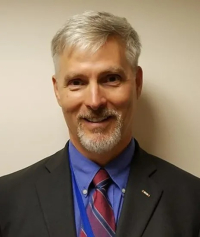
Dr. Peter L. Hays is an Adjunct Professor of Space Policy and International Affairs at George Washington University’s (GWU) Space Policy Institute and a Senior Policy Advisor with Falcon Research. He has been directly involved in helping to develop and implement major national security space policy and strategy initiatives since 2004 and also serves as a senior advisor on governance, cadre, and strategic messaging issues. Dr. Hays was presented the National Intelligence Professional Award by the Director of National Intelligence in 2014 and was chosen as the SAIC National Security Solutions Employee of the Year in 2008. He served as a Staff Augmentee at the White House Office of Science and Technology Policy in 1988 and at the National Space Council in 1990. Dr. Hays serves on the Space Security Index Governance Group, the Center for Strategic and International Studies Missile Defense Project Advisory Board, was a term member of the World Economic Forum’s Global Agenda Council on Space Security from 2010-2014, and is a member of the editorial board for Space and Defense and Astropolitics. He holds a Ph.D. from the Fletcher School and was an Honor Graduate of the USAF Academy. Dr. Hays served as an Air Force officer from 1979-2004; flew C-141 cargo planes; and taught international relations, defense policy, and space policy courses at the USAF Academy, School of Advanced Airpower Studies, and National Defense University; he now teaches the Airpower Seminars for the Marine Corps School of Advanced Warfighting and the Space and National Security and Science, Technology, and National Security Policy graduate seminars at GWU. Major publications include: Handbook of Space Security, Space and Security, and Toward a Theory of Spacepower.
-
Dr. Yuka Kobayashi, Lecturer (Assistant Professor), SOAS, University of London

Yuka Kobayashi (LL.B Kyoto, M.Phil., D.Phil. Oxon) is Lecturer (Assistant Professor) in China and International Politics at SOAS, University of London. She has held visiting appointments at the World Trade Organizaton (Visiting Scholar-WTO) and Nankai University, China (Visiting Research Professor). Prior to joining SOAS, she was a Junior Research Fellow at the University of Oxford. After receiving a LL.B. (specialisation in Public International Law) from Kyoto University, she studied Mandarin and Chinese International Politics at Nankai University and then obtained her M.Phil. and D.Phil. at the University of Oxford. Her research interests include International Relations of China, International Law, Connectivity (digital, space), Trade and Investment (Belt and Road Initiative/WTO/FDI), Human Rights and Climate Change/Energy.
She has advised various governments, think-tanks and international organisations on these subjects. She was appointed specialist advisor on China for the UK government (2021), and joined the advisory board for Stiftung Asienhaus (Germany, 2020-2022). From September, she will be British Academy Global Innovation Fellow (2024-2025) seconded to the German Council for Foreign Relations (DGAP). -
Peter Marquez, Head of Global Space Policy, Amazon Web Services
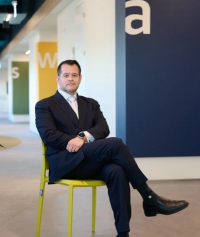
Peter Marquez is the Head of Global Space Policy at Amazon Web Services where he oversees space and global strategic program policy activities for Amazon Web Services.
Peter served at the White House for the three previous Administrations. Peter was the Director for Space Policy for Presidents Bush and Obama and a Senior Advisor to the National Space Council in the previous Administration. Peter was responsible for the development, implementation, and coordination of the U.S. national space policies. In these roles Peter also was responsible for special programs, defense intelligence, missile defense, and other strategic capabilities. Peter worked with foreign governments to; establish their own space agencies, assist in the writing of their national space policies, and create interagency processes to execute national space programs in addition to supporting the development of other key strategic national security programs.
Peter served in industry as the Managing Partner of Andart Global, U.S., the Vice President of Global Engagement for Planetary Resources, and the Vice President for Strategy at Orbital Sciences Corporation. Peter served for over a decade in the Pentagon on a variety of space and classified special programs for the Air Force and Office of the Secretary of Defense. He served in requirements, acquisition, operations, and policy roles and served as the Director of Special Programs for the Under Secretary of Defense for Policy. Peter is a graduate of the Space Policy Institute at George Washington University, a board member of the Japan Institute for Space & Security, and a member of the Space Camp Hall of Fame. -
Kevin O'Connell, Former Director of the Office of Space Commerce, U.S. Department of Commerce and Founder and Chief Executive Officer, Space Economy Rising, LLC
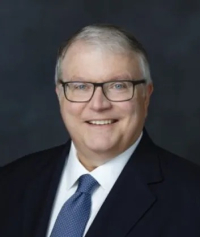
Mr. O’Connell brings almost four decades of experience in the U.S. government, in research organizations, and as an entrepreneur and business leader to this position. Mr. O’Connell has researched and written extensively on the policy, security, and global market issues related to the commercialization of remote sensing. Aside from numerous articles and op-eds, he was co-author of Commercial Observation Satellites: at the Leading Edge of Global Transparency (2000). He served as the Executive Secretary and Staff Director of the NIMA Commission (1999-2000). He was a member, and later Chair, of NOAA’s federal advisory committee on remote sensing from 2002-2016. Previously, Mr. O’Connell served as the CEO of Innovative Analytics and Training, a Washington, D.C. professional services firm focused on analysis and decision support for U.S. government and commercial clients. During this time, he also served as a senior consultant to the Office of the Director of National Intelligence and as an independent advisor to the Director, National Geospatial Intelligence Agency. Mr. O’Connell’s background also includes extensive experience in national security and intelligence matters, including assignments in the Department of Defense, Department of State, National Security Council, and the Office of the Vice President. He spent a decade conducting and managing research in these areas at the RAND Corporation, including as the first director of RAND’s Intelligence Policy Center. Finally, Mr. O’Connell has taught and lectured extensively at universities and research organizations, including MIT, Thunderbird School of Global Management and Georgetown University's School of Foreign Service.
-
Laura Winter, Host & Editor, The DownLink Podcast
 Laura Winter, an award-winning journalist, is the Editor and Host of The DownLink Podcast, a Defense & Aerospace Report production. Focussed on the intersection of space, the space business, and defense, The DownLink Podcast is a 2023 Defense Media Award winner. Laura has lived in and reported from eight countries on three continents, including seven years in Taiwan, Hong Kong, and China, and nine years in Afghanistan and Iraq. The very first beat she ever had was covering the city of La Cañada Flintridge, which included NASA’s Jet Propulsion Laboratory, for the Glendale News-Press.
Laura Winter, an award-winning journalist, is the Editor and Host of The DownLink Podcast, a Defense & Aerospace Report production. Focussed on the intersection of space, the space business, and defense, The DownLink Podcast is a 2023 Defense Media Award winner. Laura has lived in and reported from eight countries on three continents, including seven years in Taiwan, Hong Kong, and China, and nine years in Afghanistan and Iraq. The very first beat she ever had was covering the city of La Cañada Flintridge, which included NASA’s Jet Propulsion Laboratory, for the Glendale News-Press. -
Dr. Jana Robinson, Managing Director, Prague Security Studies Institute (PSSI)
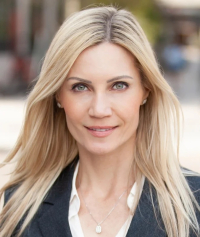
Dr. Jana Robinson has been Managing Director of the Prague Security Studies Institute (PSSI) since April 2020. She also serves as PSSI’s Space Security Program Director, a post she assumed in 2015. She previously held the position of a Space Policy Officer at the European External Action Service (EEAS) in Brussels as well as a Space Security Advisor to the Czech Foreign Ministry.
From 2009 to 2013, Ms. Robinson worked at the European Space Policy Institute (ESPI), seconded from the European Space Agency (ESA), leading the Institute’s Space Security Research Programme. Ms. Robinson is an elected member of the International Institute of Space Law (IISL) and the International Academy of Astronautics (IAA). She is also a member of the Advisory Board of the George C. Marshall Missile Defense Project of the Center for Strategic and International Studies (CSIS) in Washington, D.C. Ms. Robinson holds a PhD in the field of space security from the Charles University’s Faculty of Social Sciences, Institute of Political Studies and received two MA degrees, from George Washington University's Elliott School of International Affairs and Palacky University in Olomouc, respectively. She received scholarships to attend the International Space University’s (ISU) 2009 Space Studies Program (SSP09), the 2008 Summer Training Course at the National Taiwan Normal University in Taipei, and a one-year course of study at Shanghai University 1999-2000.
-
Dr. Il Seok Oh, Vice President, Korean Academy of Space Security (KASS)
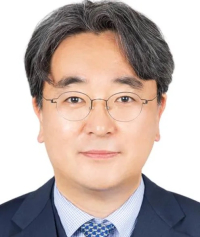
Dr. Il-seok Oh is a research fellow of the Institute for National Security Strategy (INSS) which is a think-tank funded by the Korean government. He has also served as a vice-president of the Korean Academy of Space Security (KASS). As an expert in emerging security issues, he has published many articles and notes on Space Security, Cybersecurity, Energy Security and Emerging Technology Laws and Policies. He graduated from Korea University with his Ph.D in Law. He also received his L.L.M. from the Northwestern University School of Law at Chicago in the United States of America.
-
Dr. Deganit Paikowsky, Lecturer, Department of International Relations, Hebrew University of Jerusalem

Dr. Deganit Paikowsky is an expert on International Relations with a unique focus and first-hand experience in the interface between world politics and technology, especially space. For 20 years, Dr. Paikowsky's passion and research expertise enabled her to develop a comprehensive understanding of current and future global space market and cyberspace trends and an intimate acquaintance with the space community in government industry and academia. Dr. Paikowsky exemplifies a rare combination of a theoretical social science scholar with an enormous contribution to public policy. In October 2019, Dr. Paikowsky was elected as Vice President of the International Astronautical Federation for a three-year term. In July 2020, she joined the International Relations Department at the Hebrew University of Jerusalem. Additionally, she is a non-resident scholar at the Space Policy Institute at the Elliott School for Foreign Affairs, George Washington University. Dr. Paikowsky publishes extensively in leading professional peer-reviewed journals and on popular platforms. One of the highlight of her scholarly work is her book, "The Power of the Space Club," published by Cambridge University Press.
-
Dean Cheng, Senior Advisor, China Program, United States Institute of Peace
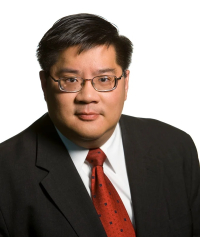
Dean Cheng was recently appointed a non-resident Senior Fellow at the Potomac Institute for Policy Studies, a Senior Adviser with the US Institute of Peace, and a non-resident fellow with the George Washington University Space Policy Institute. He retired as the Senior Research Fellow for Chinese Political and Military Affairs at the Heritage Foundation after 13 years. He is fluent in Chinese, and uses Chinese language materials regularly in his work.
Prior to joining the Heritage Foundation, he worked at the Center for Naval Analyses (CNA), a Federally Funded Research and Development Center, Science Applications International Corporation (SAIC), and as an analyst with the US Congress’ Office of Technology Assessment.
He is the author of the volume Cyber Dragon: Inside China’s Information Warfare and Cyber Operations (Praeger Publishing, 2016), and has written extensively on Chinese views of deterrence, Chinese views of space power, and Chinese mobilization, and contributed to a number of volumes on the Chinese People’s Liberation Army.
He has testified before Congress numerous times, and spoken at the National Space Symposium, the US National Defense University, the USSTRATCOM Deterrence Symposium, Harvard, and MIT. -
Julie Sheetz, Director of Strategy and Analysis, U.S. Department of Defense
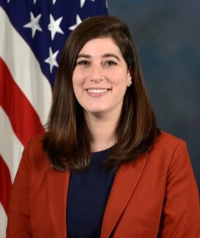
Julie Sheetz is the Director for Space Strategy & Analysis in the Office of the Secretary of Defense (OSD). In this role, she oversees the development and implementation of space-related policies and guidance for the Department of Defense to keep pace with evolving dynamics in the domain. Ms. Sheetz previously served as Chief of Staff for Indo-Pacific Security Affairs, as the lead Global Force Planner for the Indo-Pacific region, as an Asia advisor to the Chief of Naval Operations, and as a defense budgeting advisor on the Senate Defense Appropriations Committee, at the International Security Assistance Force headquarters in Kabul, and in the department’s Cost Assessment and Program Evaluation office. Before joining the Department of Defense, Ms. Sheetz was an Associate Director at BrooksBowerAsia (BBA), a boutique consulting and advisory services firm facilitating U.S. investment in Southeast Asia. Ms. Sheetz holds a Bachelor’s degree in International Relations and French Studies from the University of Pennsylvania and a Master’s degree in Regional Studies East Asia from Harvard University.
-
Rob Baker, Strategic Space Protection, VP System High Corporation
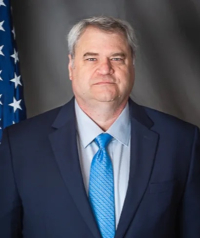
Rob Baker is Vice President of Strategic Space Protection for System High Corporation. In this role, he establishes and operates System High’s first discreetly defined market segment for strategic space protection. He seeks new opportunities for System High to support government space organizations and agencies, as well as civil space agencies.
Mr. Baker joined System High in 2009. During his time at System High, in addition to his current role, Mr. Baker has served as Vice President/Chief Strategy Officer, Vice President/Chief Business Development Officer, and Program Manager. He has more than 35 years of security operations and strategic growth experience and is a national security subject matter expert.
Mr. Baker has worked across a variety of Department of Defense and Intelligence Community security operations. In his more than three decades of experience, Mr. Baker brings to System High his vast expertise in security fields including physical security, personnel security, industrial security, information security, operations security, and program protection.
He has a master’s degree in security management from American Military University and a master’s degree in human relations from the University of Oklahoma. Mr. Baker also is a Physical Security Professional (PSP) and is a member of the Contractor Special Access Program Security Working Group. -
Dr. Regina Peldszus, Policy Officer & Space Threat Response DO European External Action Service (EEAS)
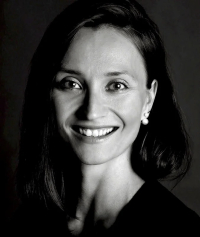
Dr. Regina Peldszus is a Policy Officer with the European Union’s External Action Service (EEAS), Security & Defence Policy Directorate, where she focuses on Space Security, Space Domain Awareness, and space threats, and serves on the team for geospatial intelligence tasking. Until 2021, she advised the Federal Ministry for Economic Affairs in Germany on Space Security for interagency and transatlantic cooperation, including wargaming and Space Situational Awareness. Previously, at the German Space Agency at DLR, she served as Co-Chair of the group of member states setting up EU Space Surveillance & Tracking (EU SST) for the European Commission, and oversaw horizon-scanning studies at the intersection of space operations, ground infrastructure, and emerging space security issues. Earlier, Regina was an Internal Research Fellow with the European Space Agency’s Space Operation Centre, Special Projects Division, on resilience of flight control during critical mission phases. Originally with a background in Human Spaceflight from a foresight and complex systems perspective, Regina holds an M.A. from Central Saint Martins, London, and a UK Research Council-funded Ph.D. from Kingston University, London, on scenario-approaches, simulators, and extreme environment analogues for future exploration missions, with stints at ESA’s Astronaut Centre, Special Skills Unit. She is a member of the IAF Space Security Committee, and a senior member of the American Institute of Aeronautics & Astronautics.
-
Gen. (Ret.) Michel Friedling, Former Commander, French Joint Space Command; Cofounder & CEO, Look Up Space
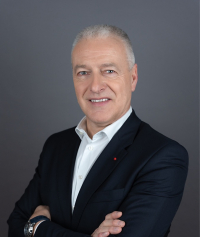
A former general in the French air and space force, fighter pilot, graduate engineer from French Air Force Academy, graduate of the “École de Guerre” and the “Centre des Hautes Etudes Militaires” (CEM), and former auditor of the IHEDN (Institut des Hautes Etudes de la Défense Nationale), Michel Friedling has held various positions in combat units and central management within the French Ministry of the Armed Forces.
Appointed head of national military space activities in 2018, he was one of the key players in drawing up the French defense space strategy published in July 2019, before becoming France's first Space Commander until 2022.
Since then, he has been co-founder and CEO of Look Up Space, which aims to make space safer and more sustainable. In 2023, Look Up Space raised the largest seed capital in French spacetech. Look Up Space was named one of the "Inventors of the Year 2024" at the Paris Saclay Summit. General Friedling is also founder and partner of Dragonfly Space Partners, a consulting firm specializing in the space sector. He is also a board member of several space and aerospace companies. More recently, he has been appointed as a member of the Advisory Council of European Space Policy Institute (ESPI), an independent Vienna-based think tank developing positions and strategies for Europe's space activities.
Michel Friedling has logged more than 2,400 flying hours on fighter aircraft and 71 war missions to his credit. He is Grand Officier de l'Ordre National du Mérite, Officier de la Légion d'Honneur, Officer of the Legion of Honor (USA), and decorated with the Order of the Rising Sun, Gold Rays with Rosette (Japan).
He is the author of "Space Commander - Issues, Threats And Challenges of the New Space Age", published in French by Bouquins in October 2023.
-
Theresa Hitchens, Reporter, Space and Air Force, Breaking Defense